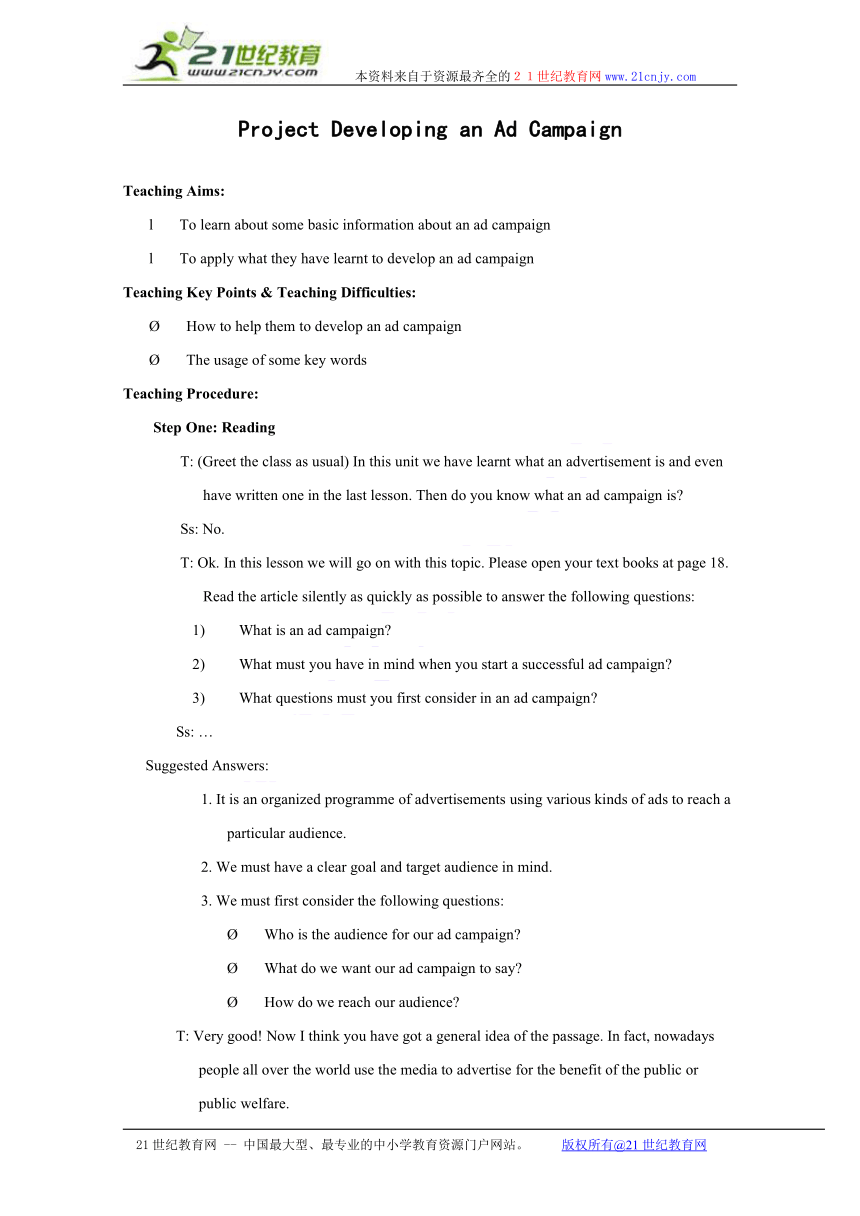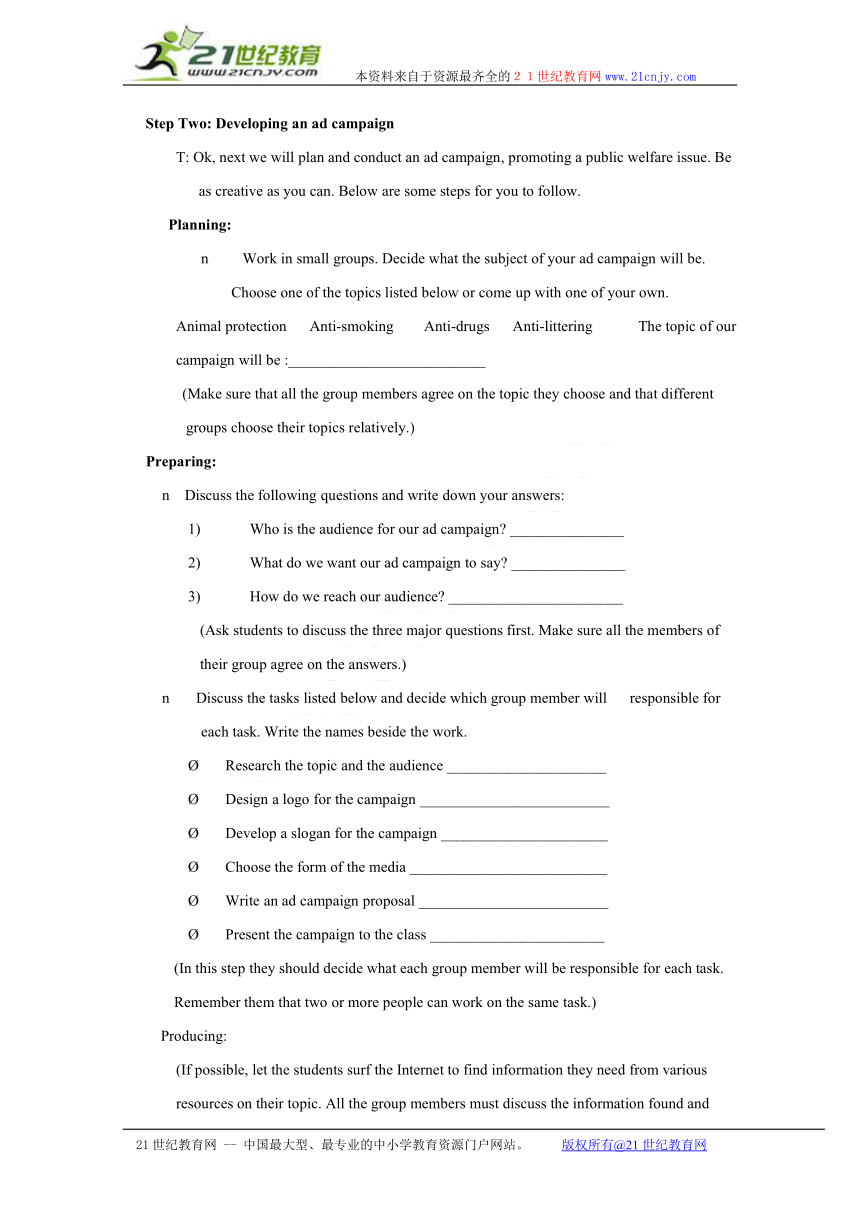英语:unit1 advertising project教案(牛津译林版必修4)
文档属性
| 名称 | 英语:unit1 advertising project教案(牛津译林版必修4) |

|
|
| 格式 | rar | ||
| 文件大小 | 14.0KB | ||
| 资源类型 | 教案 | ||
| 版本资源 | 牛津译林版 | ||
| 科目 | 英语 | ||
| 更新时间 | 2009-09-04 00:00:00 | ||
图片预览


文档简介
本资料来自于资源最齐全的21世纪教育网www.21cnjy.com
Project Developing an Ad Campaign
Teaching Aims:
l To learn about some basic information about an ad campaign
l To apply what they have learnt to develop an ad campaign
Teaching Key Points & Teaching Difficulties:
How to help them to develop an ad campaign
The usage of some key words
Teaching Procedure:
Step One: Reading
T: (Greet the class as usual) In this unit we have learnt what an advertisement is and even have written one in the last lesson. Then do you know what an ad campaign is
Ss: No.
T: Ok. In this lesson we will go on with this topic. Please open your text books at page 18. Read the article silently as quickly as possible to answer the following questions:
1) What is an ad campaign
2) What must you have in mind when you start a successful ad campaign
3) What questions must you first consider in an ad campaign
Ss: …
Suggested Answers:
1. It is an organized programme of advertisements using various kinds of ads to reach a particular audience.
2. We must have a clear goal and target audience in mind.
3. We must first consider the following questions:
Who is the audience for our ad campaign
What do we want our ad campaign to say
How do we reach our audience
T: Very good! Now I think you have got a general idea of the passage. In fact, nowadays people all over the world use the media to advertise for the benefit of the public or public welfare.
Step Two: Developing an ad campaign
T: Ok, next we will plan and conduct an ad campaign, promoting a public welfare issue. Be as creative as you can. Below are some steps for you to follow.
Planning:
n Work in small groups. Decide what the subject of your ad campaign will be. Choose one of the topics listed below or come up with one of your own.
Animal protection Anti-smoking Anti-drugs Anti-littering The topic of our campaign will be :__________________________
(Make sure that all the group members agree on the topic they choose and that different groups choose their topics relatively.)
Preparing:
n Discuss the following questions and write down your answers:
1) Who is the audience for our ad campaign _______________
2) What do we want our ad campaign to say _______________
3) How do we reach our audience _______________________
(Ask students to discuss the three major questions first. Make sure all the members of their group agree on the answers.)
n Discuss the tasks listed below and decide which group member will responsible for each task. Write the names beside the work.
Research the topic and the audience _____________________
Design a logo for the campaign _________________________
Develop a slogan for the campaign ______________________
Choose the form of the media __________________________
Write an ad campaign proposal _________________________
Present the campaign to the class _______________________
(In this step they should decide what each group member will be responsible for each task. Remember them that two or more people can work on the same task.)
Producing:
(If possible, let the students surf the Internet to find information they need from various resources on their topic. All the group members must discuss the information found and decide what to include in the ad campaign. T can help them to learn how to work together to complete the ad campaign. Set a deadline for it if they can not finish it in class.)
Presenting:
n Explain who your target audience is, what the campaign goal is, which forms of media you will use, and talk about the logo and the slogan.
n Answer any questions raised by your classmates about your ad campaign.
n Post your logo and slogan on the display wall of your classroom.
Step Three: Language Points
1) have … in mind 考虑/想到/记得…
e.g. Who do you have in mind for the job
e.g. It’s hard to have all the new words in mind in such a short time.
2) try to do sth 努力试图做某事(未必成功)
try doing sth 尝试做某事 (表示方法的改变,与以往不同)
e.g. Tom tried to persuade me to give up smoking but failed.
e.g. Why not try going to school on foot today
3) have the chance to do sth
have the chance of doing sth 有机会/可能做某事
by chance 偶然地
chance to do sth 碰巧做某事
4) appeal to … 迎合/吸引/呼吁…
e.g. The government is appealing to every one to save resources.
e.g. Cartoon films appeal to both children and adults.
5) determine vt./vi. 决定;决心
determine to do sth 决定去做某事
be determined to do sth 决心做某事
6) be concerned about/for/over … 关心/关注…
be concerned with … 和…有关;关心…
be concerned to do sth (很)想做某事
e.g. Nowadays more and more people are concerned about protecting environment.
e.g. I am concerned to know your decision.
7) be particular about/over … 对…挑剔/讲究
in particular 尤其;特别(作状语)
e.g. Tom is particular about food and clothing.
e.g. He likes reading the books written by Lu Xun in particular.
Step Four: Homework:
To do Parts B1 and B2 on page 91 in Workbook
To do parts D1 and D2 on page 93 in workbook
21世纪教育网 -- 中国最大型、最专业的中小学教育资源门户网站。 版权所有@21世纪教育网
Project Developing an Ad Campaign
Teaching Aims:
l To learn about some basic information about an ad campaign
l To apply what they have learnt to develop an ad campaign
Teaching Key Points & Teaching Difficulties:
How to help them to develop an ad campaign
The usage of some key words
Teaching Procedure:
Step One: Reading
T: (Greet the class as usual) In this unit we have learnt what an advertisement is and even have written one in the last lesson. Then do you know what an ad campaign is
Ss: No.
T: Ok. In this lesson we will go on with this topic. Please open your text books at page 18. Read the article silently as quickly as possible to answer the following questions:
1) What is an ad campaign
2) What must you have in mind when you start a successful ad campaign
3) What questions must you first consider in an ad campaign
Ss: …
Suggested Answers:
1. It is an organized programme of advertisements using various kinds of ads to reach a particular audience.
2. We must have a clear goal and target audience in mind.
3. We must first consider the following questions:
Who is the audience for our ad campaign
What do we want our ad campaign to say
How do we reach our audience
T: Very good! Now I think you have got a general idea of the passage. In fact, nowadays people all over the world use the media to advertise for the benefit of the public or public welfare.
Step Two: Developing an ad campaign
T: Ok, next we will plan and conduct an ad campaign, promoting a public welfare issue. Be as creative as you can. Below are some steps for you to follow.
Planning:
n Work in small groups. Decide what the subject of your ad campaign will be. Choose one of the topics listed below or come up with one of your own.
Animal protection Anti-smoking Anti-drugs Anti-littering The topic of our campaign will be :__________________________
(Make sure that all the group members agree on the topic they choose and that different groups choose their topics relatively.)
Preparing:
n Discuss the following questions and write down your answers:
1) Who is the audience for our ad campaign _______________
2) What do we want our ad campaign to say _______________
3) How do we reach our audience _______________________
(Ask students to discuss the three major questions first. Make sure all the members of their group agree on the answers.)
n Discuss the tasks listed below and decide which group member will responsible for each task. Write the names beside the work.
Research the topic and the audience _____________________
Design a logo for the campaign _________________________
Develop a slogan for the campaign ______________________
Choose the form of the media __________________________
Write an ad campaign proposal _________________________
Present the campaign to the class _______________________
(In this step they should decide what each group member will be responsible for each task. Remember them that two or more people can work on the same task.)
Producing:
(If possible, let the students surf the Internet to find information they need from various resources on their topic. All the group members must discuss the information found and decide what to include in the ad campaign. T can help them to learn how to work together to complete the ad campaign. Set a deadline for it if they can not finish it in class.)
Presenting:
n Explain who your target audience is, what the campaign goal is, which forms of media you will use, and talk about the logo and the slogan.
n Answer any questions raised by your classmates about your ad campaign.
n Post your logo and slogan on the display wall of your classroom.
Step Three: Language Points
1) have … in mind 考虑/想到/记得…
e.g. Who do you have in mind for the job
e.g. It’s hard to have all the new words in mind in such a short time.
2) try to do sth 努力试图做某事(未必成功)
try doing sth 尝试做某事 (表示方法的改变,与以往不同)
e.g. Tom tried to persuade me to give up smoking but failed.
e.g. Why not try going to school on foot today
3) have the chance to do sth
have the chance of doing sth 有机会/可能做某事
by chance 偶然地
chance to do sth 碰巧做某事
4) appeal to … 迎合/吸引/呼吁…
e.g. The government is appealing to every one to save resources.
e.g. Cartoon films appeal to both children and adults.
5) determine vt./vi. 决定;决心
determine to do sth 决定去做某事
be determined to do sth 决心做某事
6) be concerned about/for/over … 关心/关注…
be concerned with … 和…有关;关心…
be concerned to do sth (很)想做某事
e.g. Nowadays more and more people are concerned about protecting environment.
e.g. I am concerned to know your decision.
7) be particular about/over … 对…挑剔/讲究
in particular 尤其;特别(作状语)
e.g. Tom is particular about food and clothing.
e.g. He likes reading the books written by Lu Xun in particular.
Step Four: Homework:
To do Parts B1 and B2 on page 91 in Workbook
To do parts D1 and D2 on page 93 in workbook
21世纪教育网 -- 中国最大型、最专业的中小学教育资源门户网站。 版权所有@21世纪教育网
